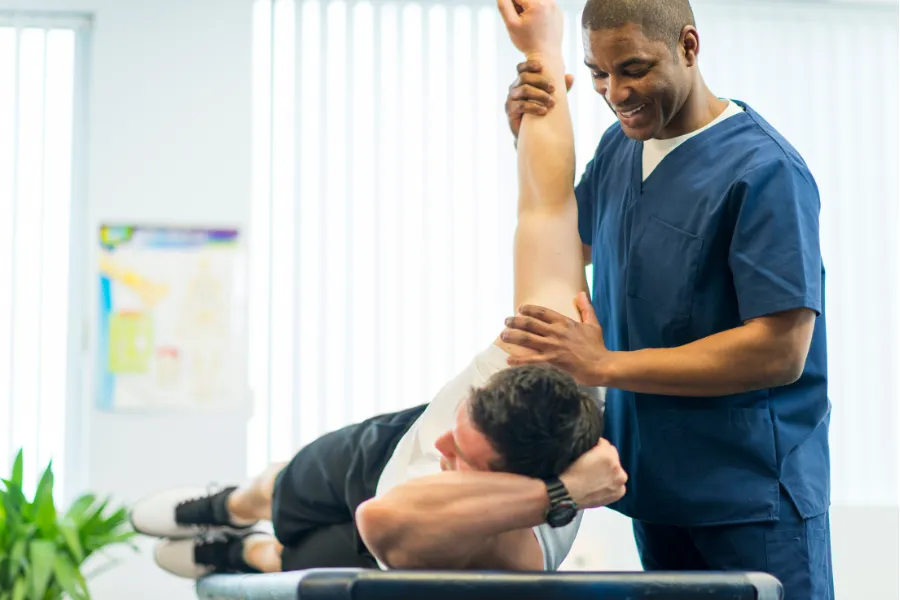5 Great Exercises to Strengthen Your Knees
One of the best ways to develop stronger knees and ward off future injuries is to build strong, fluid and solid muscles around the knees and in your legs and core.
By incorporating precise knee stretches and targeted exercise for knee pain into your routine, you can revamp and enhance the strength of those achy knees that have been bothering you for years.
Why Is Exercise to Strengthen Your Knees Important?
Strength and flexibility go hand-in-hand: a fluid muscle is a happy muscle. Knee exercises and stretches that promote both power and flexibility are of the greatest benefit, because they can help you prevent injury.
Knee strengthening exercises develop the muscles around the knee, but they can also cause the muscles to get tight, if not stretched properly. A tight muscle will constrict the knee joint and be more prone to injury. Stretching after knee strengthening exercise will alleviate muscle soreness and keep the muscles long and elastic.
5 Exercises to Help Strengthen Your Knees
Before embarking on any kind of training regimen, consulting with a certified physical therapist is a small investment that can pay huge dividends down the road. The expert advice of a trained professional, with no referral needed, can save you time, allow you to work more efficiently and guide you toward the best exercises for your own unique situation.
Exercise 1: Knee Extension
As you get stronger, you can add light ankle weights to increase the resistance. Your kneecaps will love you for this one! Your hamstring muscles will also get an excellent stretch in the process, as you strengthen your quads.
Exercise 2: Knee Flexion (Standing)
Do 10 repetitions, and repeat with the other leg. You can do 2-3 sets as needed.
As you get stronger, you can add light ankle weights to increase the resistance. In this exercise, your hamstring muscles get stronger, while you stretch out your quads.
Exercise 3: Heel and Calf Raises
Stand barefoot (or wearing socks) on a 2 inch board or aerobic step. Place the toes and balls of your feet on the board, with your heels on the floor. Make sure your body is balanced; you can hold onto a support such as the wall or another stabilizing surface. Raise vertically up as high as possible onto your toes and slowly lower down. Do 10 repetitions and 2-3 sets, as needed.
A great variation of this exercise is to to turn your toes inward (heels away from each other) and raise up vertically. This isolates and strengthens the inner part of your calf muscles. Then try turning your toes out and bring your heels close together, and raise up vertically. This will isolate the outer portion of the calves.
This is a fantastic exercise that will benefit both your knees and your ankles at the same time.
Exercise 4: Wall Squats
You should keep your abdominal muscles engaged and not allow your pelvis to slide down lower than your knees. Avoid bringing the knees forward over the toes.
This quadriceps exercise will strengthen your knee joint and build stamina along the entire leg.
Exercise 5: Swimming
Fortunately swimming is one of the best activities you can do to improve bad knees. Treading water, front crawl, backstroke or just kicking laps with a flutter board will not only solidify your knee joint, but will give you a great cardio workout as well. Jogging in water or water aerobics are other options you can try in a pool as well.
What Are the Results of Exercises to Help Strengthen Your Knees?
By strengthening the muscles around your knee, you’ll be able to relieve the regular strain placed on the knee joint. With less stress on the knee, you’ll be able to boost your chances to relieve pain and avoid further injury.
As with all things, action is the key. It’s crucial to make time in our busy schedules to devote to improving our joints and bodies. Investing just fifteen minutes a day can provide a great payoff for your quality of life down the road.
A final note: the term ‘no pain, no gain’ is outdated and obsolete. You should never experience sharp or shooting pain when engaging in the above exercises. If you do, modify your position or consult your doctor or a physical therapist.



